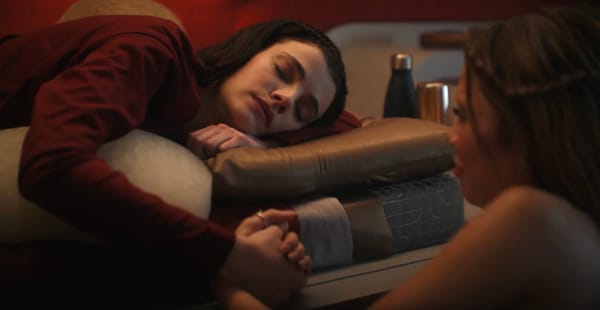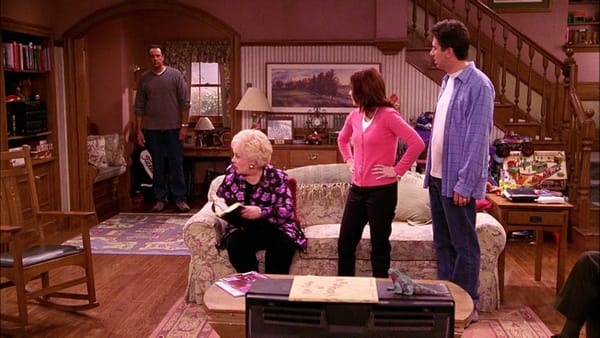The ferocious battle for Howdy Doody
What do you do when the title character of your TV show disappears because he's a puppet and somebody took him?

Quick. What does Howdy Doody look like?
The odds are pretty good that your answer was, "I have no idea" or "Who's Howdy Doody?" The character, a groundbreaking one in early television, has mostly faded into obscurity over the course of my lifetime. But if you're like me and you have never seen the show but have seen vestiges of its vast pop cultural footprint, then you know that Howdy Doody looks like this:

See? You know him, right? He's Howdy Doody, the tiny man-boy marionette in Western wear who capitalized on the cowboy craze of the mid-20th century! He was the original superstar of kids TV! From 1947 to 1960, across thousands of episodes, the little guy joined host Buffalo Bob Smith and Clarabell the Clown (who did not speak) for adventures that usually had something to do with cowboys or circuses.
Also, it has one of the scariest TV finales of all time.
On this date 1960, the final episode of #HowdyDoody ends with #Clarabell the Clown saying the final two words of the show, "Goodbye Kids", his only spoken dialogue throughout the entire series. pic.twitter.com/5nMMCbbX1jSeptember 24, 2021
But did you know the Howdy Doody you know (if, indeed, you know Howdy Doody at all) is the second Howdy Doody? There was another Howdy Doody, a predecessor to the puppet you saw above, and almost no footage or images of that puppet exist. The story of what happened to the original puppet is one of TV's earliest battles between talent and behind the scenes folks, and it's one that ends in ignominy for a great puppet artist.
Howdy Doody, like many early TV sensations, got his start on the radio. Buffalo Bob Smith (who would later host Howdy Doody on TV) was WNBC's morning DJ, and his repertoire included numerous characters he voiced, mostly to appeal to kids. One of them was a yokel type with a thick drawl whom Smith named Elmer. But Elmer was fond of saying "howdy doody," to indicate he came from out West, and kids started to think his name was Howdy Doody, and well...
NBC invited Smith to turn his kids show into a TV show called Puppet Playhouse. And, of course, he wanted to bring Elmer to television. And, of course, he was just gonna do what the kids wanted and call the character Howdy Doody. But to bring his most beloved character to TV, he had to have a puppet worthy of him.
Enter Frank Paris.
Paris was a renowned puppeteer, who was best known for elaborate marionette creations that were meant to imitate real dancers. The above routine, for instance, is meant to be vaguely reminiscent of Carmen Miranda. This kind of fluid puppeteering has always been difficult to make a living doing, but Paris soon built a reputation as one of the very best, and he was soon called on to provide puppets for all sorts of occasions.
Including Puppet Playhouse. When Smith came to Paris to ask him to make a Howdy Doody puppet, all Paris had to go on was the voice Smith used on the radio. There were no images of the character. He could do whatever he wanted. So naturally, what he came up with looked like this.
This version of Howdy Doody is disturbing to look at, yes, but kids loved him, because they loved the character, and they had no preconceptions about what he looked like. (Smith would long claim he thought the original Howdy Doody was ugly, but that has an air of "doth protest too much" to me.) Goofy and gawky and gangly, Howdy Doody soon became perhaps the earliest kids TV star. And Frank Paris was there with him every step of the way. The puppet stood to become Paris's most beloved creation.
What happens to kids TV stars? They get merchandised! Macy's approached Paris about making dolls of the original Howdy Doody, because the demand for them was so great. Paris was only too happy to oblige, but when he checked with Smith, he learned that he did not, indeed, own the character or his likeness. Smith, who had originated the character on the radio, owned Howdy Doody. And Paris didn't have time for a lawsuit. Macy's needed those dolls on shelves now.
So Paris used what leverage he had. Smith might have owned the character, but he didn't own the puppet. And puppets can be transported easily. Mere hours before a live broadcast, he sealed up Howdy Doody in a trunk and walked out of the studio with him. That original puppet, so far as I can tell, has not been seen since.
Pandemonium. NBC tried to get Paris to come back. Paris demanded a cut of Howdy Doody merchandise sales. Everything slid south very quickly, and soon, it became clear this dispute was not getting resolved. Paris wanted to make money off the likeness of his creation. Smith and NBC weren't going to back down on that point. Howdy Doody was gone.
Here's where it becomes important to remember that while Smith didn't puppeteer Howdy Doody, he did provide the character's voice. And as such, Howdy Doody could continue to "appear," even if he wasn't physically on camera. The other performers on the show vamped for time, and eventually, all involved settled on a story: Howdy Doody was out on the campaign trail for the 1948 presidential election, running for President of Kids. He would "phone in" (voiced by Smith) and let the kids know what was up.
This storyline also allowed the show's producers to cook up a singularly unlikely turn of events. Howdy Doody was worried that he was running way behind the more photogenic Mr. X (presumably his campaign didn't have access to snap polling), so he opted to have plastic surgery to make himself more appealing to look at. Behind the scenes, NBC hired a new team that included Disney animator Mel Shaw to create a new marionette. The final design came from Velma Wayne Dawson, who would continue to build new Howdy Doody models until the show ended.
And when Howdy Doody returned to reveal the effects of his plastic surgery, he looked like... well, he looked like Howdy Doody.
And so Frank Paris was removed entirely from the show he had helped make a sensation. He created a new kids TV puppet for a show called Peter Pixie, but have you ever heard of Peter Pixie? I didn't think so. Howdy Doody ran for 12 more years, and when the time came to count the votes and name the new president of kids, guess who won?
(After Smith's death, a second custody battle for Howdy Doody erupted. This one concluded with the elderly Dawson being dragged into court and concluding that the Howdy Doody marionette in question was, indeed, the original one she had created in 1948. It now resides in a museum in Detroit.)
Television is not a medium that is kind to the people who make it. Even those who are responsible for major successes can overestimate their own importance to a project. At the end of the day, even the most important showrunner or star is subject to the crushing need for the network to keep as much money as it possibly can. When you read about someone being fired from a show over some dispute or another, think of poor Frank Paris, perhaps the first man to realize his TV creation had grown far beyond his ability to control.
I hope his family still has that original puppet in a trunk somewhere.
Talk back to me: Tell me about the time you stole a beloved puppet. Or, barring that, tell me about the first time you truly loved a TV show as a kid. Answer in comments!
What I've been up to: Hey, have you checked out Reservation Dogs on FX (on Hulu)? It's one of my favorite shows of the year, easily, and I'm so glad that it seems like people are watching it! Or at least a bunch of people read this article, so.
I’ve only seen one season of FX’s terrific new comedy Reservation Dogs, but I’m happy to add it to the list. (Season one is now available on Hulu.) From the first scene of its premiere to the last scene of its finale, the show’s first season is eight episodes of sharp-witted, perfectly balanced comedy, with just enough dramatic heft. It gives the teenage characters, who are all small-time criminals trying to save up enough money to leave their Oklahoma reservation, much more weight than you might expect.
What you missed if you're not a paid subscriber to Episodes: My Fleabag reviews concluded with my take on the final two episodes. I'm really proud of these pieces, and I would love if you checked them out. But on Wednesday, we ran a terrific consideration of Boy Meets World from Madison Davis. She takes on the show's inherent conservatism.
Beyond nostalgia, perhaps the allure of dated sitcoms is that when watching, there's no waiting for a “mask-off” moment, because the mask was never on in the first place. The stakes are lowered in this sort of viewing, providing an ease not always afforded in contemporary white-run and centered TV shows that insist they’re in on the joke without fully understanding the object of ridicule. I’m certainly not yearning for a return to Happy Days, but it’s important to consider that a simple acknowledgement of social issues is not inherently more investigatory or a sign of progress than the presence of a singular non-white person in the cast, like Angela on Boy Meets World.
Read me: Profiles of famous people that grapple with what's complicated and difficult about them are rare. I'm so glad this profile of Dan Savage by L.V. Anderson exists. It gets at the man's strengths and limitations almost perfectly, and I'm so jealous of the last few paragraphs.
In Seattle, when he talked through the famous controversies he’s faced and some less well-known ones, he was thoughtful and conciliatory but also seemed to be negotiating with me: Wouldn’t I agree he has a point about the erotics of power imbalances between young people and older people? Don’t straight men actually need a “safe space” for their sexuality more than ever? By the time we got to my own experience as a woman who regretted trying to be “good, giving, and game” when dating men, I’d found a new way to understand Savage’s power—and his limitations.
Watch me: Demi Adejuyigbe's "September 21" videos (posted annually from 9/21/2016 through 9/21/2021) are one of the great art projects of our time. The way the ambition scaled up is admirable, and I love his willingness to commit to a bit. He might be the funniest person alive?
And another thing... So this happened...
Congratulations @emilyvdw! pic.twitter.com/biboxgDa4vSeptember 21, 2021
Opening credits sequence of the week: This is what more shows should open with: just a pretty woman and a goat walking through the woods. Allow me to introduce Tammy.
A thing I had to look up: Honestly, everything. I knew the bare bones of the Howdy Doody story, but I had to remind myself of almost every particular. And aren't you glad I did???
This week's reading music: "Blue Heaven" by Public Service Broadcasting
Episodes is published three times per week. Mondays feature my thoughts on assorted topics. Wednesdays offer pop culture thoughts from freelance writers. Fridays are TV recaps written by myself. The Wednesday and Friday editions are only available to subscribers. Suggest topics for future installments via email or on Twitter. Read more of my work at Vox.




